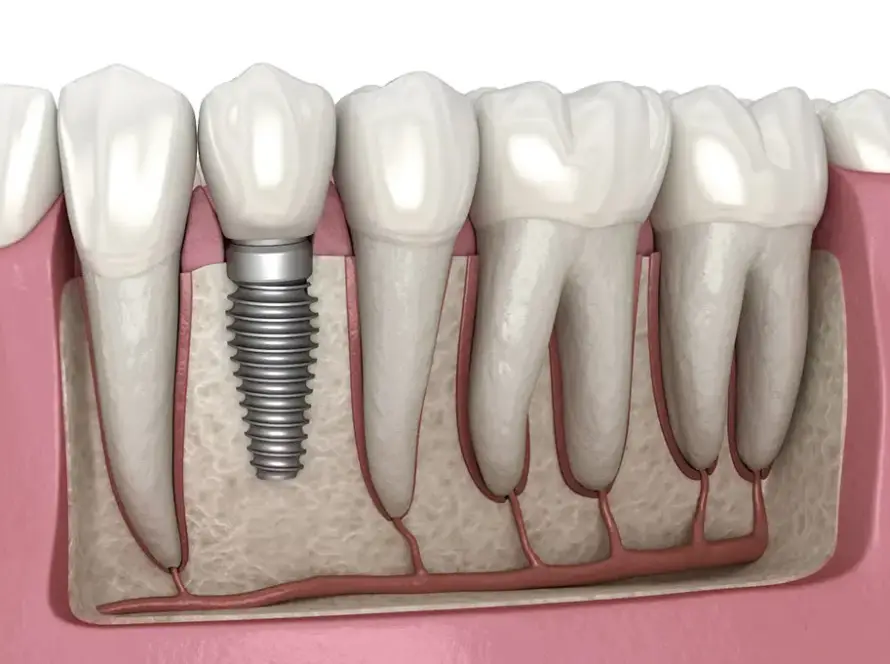Yes, diabetic patients can also get dental implants. However, the dentist must assess whether the diabetes is under control and whether this has any impact on the success of the implant procedure. If the diabetes is controlled and other health conditions are suitable, it is possible to undergo dental implant surgery. However, if the diabetes is not controlled or other health conditions are not suitable, dental implant surgery may be risky and may not be recommended. Therefore, diabetic patients should consult with dentists before deciding on dental implant surgery and consult with a healthcare professional to assess all health conditions.
Dental implant treatment is a method for replacing your teeth with new teeth. This treatment aims to replace lost or teeth that need to be extracted with new teeth. Implant teeth are placed on titanium screws that are placed in your body’s bone tissue and your body accepts these screws as bone tissue. Afterwards, crowns specially manufactured for implant teeth are placed on the implant teeth, allowing you to restore your teeth and regain the strength of your jaw. Implant dental treatment is more durable and natural-looking than dentures, but it is more expensive and takes a longer process. Before starting implant dental treatment, your doctor will conduct a physical examination to assess the condition of your teeth and jaw and determine whether this treatment is suitable for you. If this treatment is suitable for you, your doctor will create a treatment plan and procedures will be performed according to this plan.
The success rate of dental implant treatment is high and most people are able to regain the strength of their jaws by replacing their teeth with this treatment. However, as with any treatment, there are some risks involved with dental implant treatment and it is important to follow your doctor’s recommendations.
WHEN IS AN IMPLANT DONE?
Dental implant surgery is performed by placing a new tooth implant in the place of a missing tooth. This surgery is performed by dentists and usually takes a few hours. The difficulty of the implant surgery can vary depending on various factors and the condition of the patient’s teeth. For example, an implant surgery may take longer and be more difficult if the patient has experienced a lot of bone loss or if their teeth are very weak. The difficulty of the implant surgery can also vary depending on the experience of the dentist.
There are several steps involved in the process of having an implant surgery. First, the dentist will assess the condition of the patient’s teeth and may take x-rays if necessary.
Then, the dentist will place an implant in the patient’s jawbone. This implant is usually made of titanium and allows the body to accept the foreign object. A tooth prosthesis is then placed on top of the implant, giving the patient’s teeth a nice appearance.
Can implants be done for diabetic patients?
For an implant surgery to be performed, the patient’s jawbone must have sufficient amount and the patient must have the ability to heal wounds in a healthy manner. If the patient smokes or has diabetes, there may be special conditions for having an implant surgery and the dentist will evaluate these. Generally, implant surgery is a painless procedure and you can return to normal activities within a few days. However, your dentist will give you more detailed instructions and it is important to follow all of these instructions carefully. If you experience pain or other problems during the implant surgery, it is important to consult with your dentist.
Can diabetics get implants?
In diabetics, the healing process of bones is often slower and therefore it is important for those considering getting an implant to keep their diabetes under control. There are a few things to consider when getting an implant for a diabetic:
- Keeping diabetes under control: It is very important to keep diabetes under control in order for the implant to be successfully placed. Therefore, those considering getting an implant should follow a diet and exercise program that will help control their diabetes.
- Ensuring healthy gums: It is important for the gums to be healthy in order for the implant to be successfully placed. Therefore, those considering getting an implant should make sure their gums are healthy.
- Ensuring strong bones: It is necessary for the bones to be strong in order for the implant to be successfully placed. Therefore, those considering getting an implant should make sure their bones are strong.
Here are a few suggestions for diabetics considering getting an implant:
- Keep diabetes under control: It is very important to keep diabetes under control in order for the implant to be successfully placed. Therefore, the person considering getting an implant should follow a diet and exercise program that will help control their diabetes.
- Ensure healthy gums: It is important for the gums to be healthy in order for the implant to be successfully placed. Therefore, the person considering getting an implant should make sure their gums are healthy by brushing, using dental floss and regularly visiting the dentist.
- Ensure that your bones are strong enough: In order for the implant to be successfully placed, your bones must be strong enough. Therefore, if you are considering getting an implant, you should exercise in a way that strengthens your bones and avoid factors that weaken them (such as smoking or excessive alcohol consumption).Consult with your doctor: The placement of an implant is a surgical procedure and therefore you should follow the recommendations of your doctor. When you tell your doctor that you are considering getting an implant, they will examine your bones and teeth to determine if they are healthy enough and decide whether or not an implant is appropriate.















